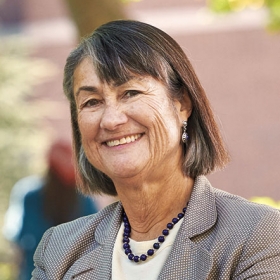1944–2020
Sally Engle Merry ’66, formerly the Marion Butler McLean Professor in the History of Ideas and professor of anthropology, passed away on Sept. 8, 2020.

Sally Engle Merry ’66, formerly the Marion Butler McLean Professor in the History of Ideas and professor of anthropology, passed away on Sept. 8, 2020. Sally was a pioneer in research on legal anthropology and legal pluralism. She was an inspiration to students at Wellesley, at New York University where she later taught, and across the globe. Her research on human rights, gender violence, colonialism, and anthropology and law revolutionized sociolegal scholarship and made her a beacon in many intellectual fields.
Sally’s passion for anthropology was born at Wellesley, and she graduated summa cum laude in 1966, as a Durant Scholar and as a member of Phi Beta Kappa. She returned to the College nearly a decade later, in 1974, as an assistant professor of anthropology, rose to the rank of full professor, and became the Class of 1949 Professor in Ethics in 1994. She chaired the anthropology department and co-chaired the peace and justice studies program. In 2003, she was named the McLean Professor in the History of Ideas. Sally left Wellesley in 2005 for New York University, where she taught as the Julius Silver Professor of Anthropology, and as an affiliated faculty member at NYU Law. She also served as codirector of NYU’s Center for Human Rights and Global Justice, and as director of NYU’s Law and Society Program.
Sally was a prodigious and insightful writer. Whether it was her pioneering work in the field with working-class laborers in Massachusetts explored in Getting Justice and Getting Even (1990), her archival work on law and colonialism in Colonizing Hawai‘i: The Cultural Power of Law (2000), or her newest work, The Seductions of Quantification: Measuring Human Rights, Gender Violence, and Sex Trafficking (2016), she set an ambitious and exhilarating agenda for the anthropology of law. With remarkable warmth and compassion, she found inventive and ingenious ways to apply anthropology theory and methods to legal questions and problems.
At Wellesley, Sally’s deep curiosity and sharp intellect helped shape the College’s anthropology and peace and justice studies curriculums, as well as the innovative First-Year Cluster program. Of her teaching, she once wrote: “One of my major goals is to help students find their own voices, to show them that they have considered judgments about the material they are learning and that these judgments are central to their intellectual growth.” Throughout her time at Wellesley, she was deeply invested in efforts to draw together social science faculty around shared research interests. She was a strong supporter of what became the Knapp Social Science Center, and a proponent of closer connections between the faculty and the Wellesley Centers for Women.
Her curiosity, courage, generosity, and grace were just some of her marvelous qualities—qualities that enlivened our campus community, and the lives of her colleagues and students. She made Wellesley a richer, fuller place, and her ideas and her work will live on for decades in her groundbreaking writing and the generations of anthropologists she helped mentor and train.